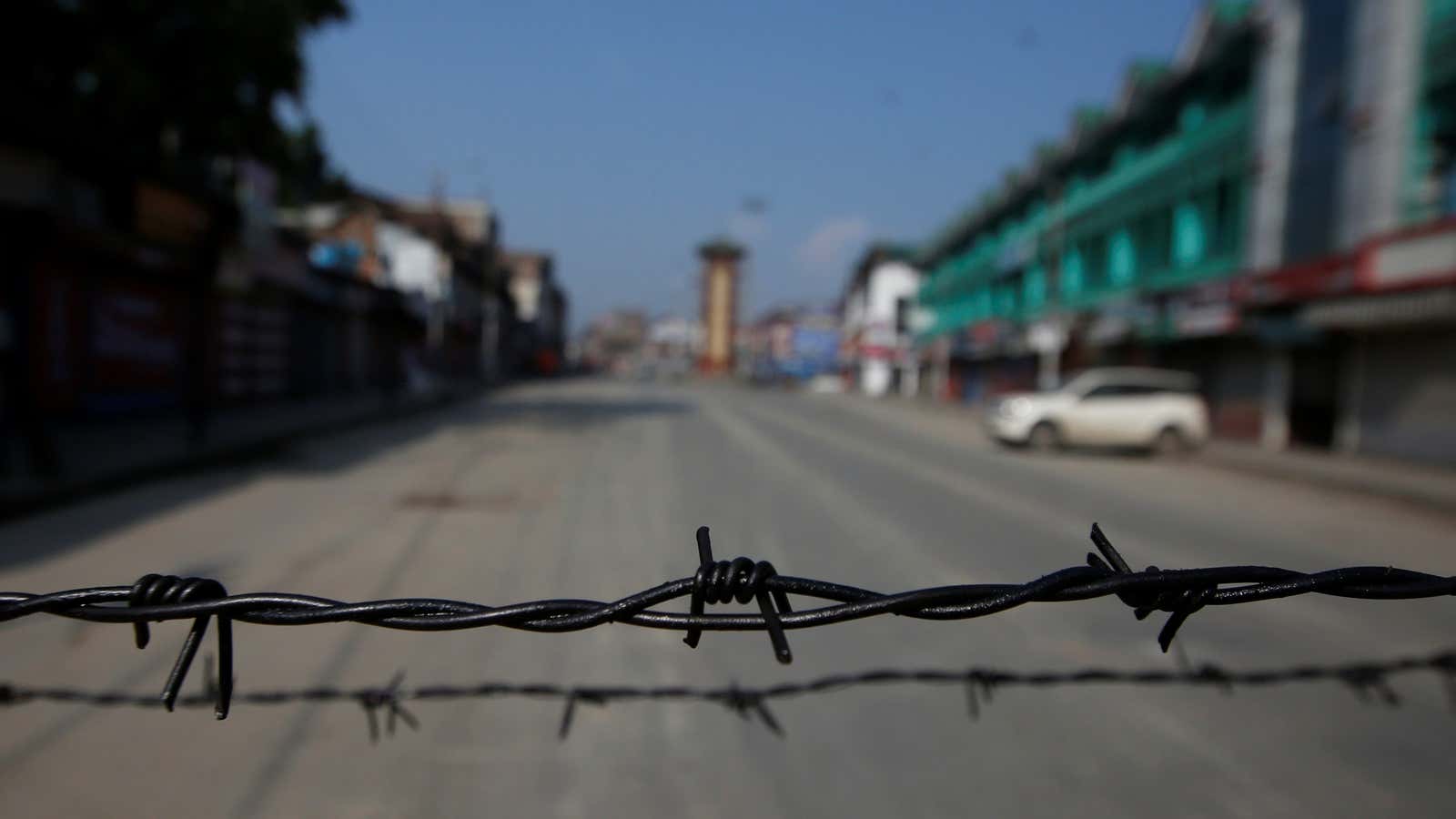Indian Twitter is abuzz tonight over something a bit surprising: a scientific journal. A prestigious weekly British medical journal decided to publish an editorial that appears to criticise the Indian government’s actions in Kashmir.
Earlier this month, India repealed an article in its constitution that granted special semi-autonomous status to the state of Jammu & Kashmir. The controversial move to strip the country’s only Muslim-majority state of its historical independence from India set off a bitter debate within the country and attracted international concern. Foreign governments and international organisations have called for restraint—and now, so have some medical journals.
On Saturday (Aug. 17), The Lancet’s editorial board published an opinion piece titled “Fear and uncertainty around Kashmir’s future.” It states that the presence of thousands of Indian security forces in Kashmir “raises serious concerns for the health, safety, and freedoms of the Kashmiri people.”
Hundreds of Twitter users criticised The Lancet for weighing in on the situation in Kashmir, and some accused it of singling out India for criticism. The Indian Medical Association wrote to The Lancet accusing it of “interference into an internal matter,” and questioning “the credibility and the malafide intention behind the uncalled for editorial.”
This is not the first time that The Lancet, or other medical journals, has weighed in on geopolitical conflicts. In fact, as it explained in a 2014 editorial on the crisis in Gaza, the journal believes it’s part of its role to comment on situations in which it feels that “the interests of civilian lives” are sacrificed at the expense of “the politics of military engagement.” The 2014 editorial reads:
The Lancet is a general medical journal that publishes research, news, and opinion about all aspects of human health and wellbeing. In situations of war and conflict—such as in Iraq, Syria, Afghanistan, and elsewhere—our perspective has always been to put the interests of civilian lives ahead of the politics of military engagement. In the conflict taking place in Gaza, our position is very clear. We do not support any side whose actions lead to civilian casualties. The role of the doctor is to protect, serve, and speak up for life. That, too, is the role of a medical journal.
Below are some examples of situations, ranging from conflict zones to national crises, in which The Lancet has published editorials:
US military presence in Afghanistan
In a presidential address delivered on Aug. 21, president Donald Trump declared that the USA would be maintaining and expanding its military presence in Afghanistan. In his speech, the president was very clear: his goal is “not nation-building again; we are killing terrorists.” Once more, the people of Afghanistan seem to have been relegated to the backdrop of the conflict.
— Supporting the need for nation-building in Afghanistan, Sept. 2, 2017.
European migrant crisis
Affected children are clearly traumatized. Many will have already fled war, poverty, or persecution. Along the way they may have lost parents or siblings or been separated from them. But instead of treating that trauma, our collective failure has led to their re-traumatisation. At such a crucial time of a child’s development, the physical and mental health effects of this unacceptable detention are devastating. The long-term consequences will be worse. The medical community should act immediately: we must insist on the removal of these children from the camps with their families into safe and humane shelter. We must provide the health care and treatment these children need to recover from their trauma. And we must support all efforts to help them regain their resilience and hope for free and full lives.
— Trauma for migrant children stranded in Greece, March 25, 2017.
Civil war in Syria
March 15, 2017, marks the sixth anniversary of the civil war in Syria, a conflict perhaps unprecedented in its apparently shameless disregard for international law. The world has stood by in horror, watching the death toll rise and the humanitarian and refugee crises spread their indelible stain on the world map and human history. The Syrian conflict has been marked on the one hand by immense suffering and on the other by a stunning lack of adequate condemnation or action from governments, international agencies, or the medical community.
— Syria suffers as the world watches, March 14, 2017.
Gun violence in the US
It is time for US doctors and their institutions to join with Obama to take a more public stand—against gun violence and for gun control. Until the American public, whom doctors are well placed to inform, steps into this debate to demand action, Congress will continue to prevaricate. The context of a presidential election, which might have seemed inimical to sensible debate about tighter gun restrictions, could provide the perfect opportunity for a reasoned review of the facts and fallacies of gun violence. Only the American public can decide.
— Gun violence in America: a national crisis, Jan. 16, 2016.
Conflict in Gaza
[H]ere is a war that is having far-reaching effects on the survival, health, and wellbeing of Gaza’s and Israel’s civilian residents. It is surely the duty of doctors to have informed views, even strong views, about these matters; to give a voice to those who have no voice; and to invite society to address the actions and injustices that have led to this conflict. Our responsibility is to promote an open and diverse discussion about the effects of this war on civilian health. An opportunity for peace and justice surely beckons. For the health and wellbeing of civilians in both Gaza and Israel, we encourage both parties to have the courage to seize this moment.
— Gaza: an urgent call to protect civilian life and health, Aug. 4, 2014.
Update (Aug. 20): This post was updated to include comments from the Indian Medical Association
